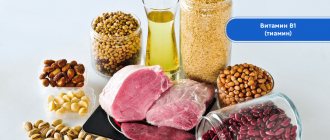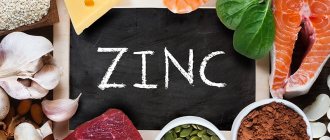Mistake #1. Not monitoring vitamin D levels
Vitamin D
has a positive effect on insulin resistance and metabolism, the body’s ability to resist acute respiratory viral infections and oxidative stress, and reduces the risk of developing cancer and abnormalities in fetal development during pregnancy. Moreover, “sunshine” vitamin D helps not to feel depressed and reduces pain during childbirth.
In regions with low levels of insolation (including St. Petersburg), vitamin D deficiency is extremely common. However, you should not take it for preventive purposes, since vitamin D is still a steroid hormone. Only after a special laboratory blood test for D-hormone can you find out its level in the body, and then correct the deficiency.
History of discovery
Ancient people noticed that certain foods could prevent diseases. The ancient Egyptians used liver to protect themselves from night blindness. The scientific works of Chinese scientists from 1330 speak of the importance of combining food products, and in 1747 in Scotland the healing effect of citrus fruits was discovered for scurvy.
The end of the 19th century brought the knowledge that proteins, fats, carbohydrates and mineral salts indicate nutritional value. At the same time, a Russian scientist named Lunin conducted experiments on mice that were fed artificial and natural milk.
Individuals of the first group died, and with natural feeding they noted a high level of health. This led to the conclusion that milk contains more than just casein, fats, sugar and salt. The composition includes other essential components. The scientific community was not ready at that time to accept the scientist’s conclusions.
It was only in 1911 that the crystalline substance was isolated by Casimir Funk, a Polish scientist. Thanks to the discovery, it became possible to treat beriberi disease (damage to brain tissue, myocardium), the symptoms of which were a deficiency of vitamin B1 in the human body. The substance was called the term “Vitamine”, where “vita” is translated from Latin as “life”, and “amine” is “organic compound” in English.
Mistake #2. Taking calcium without normalizing vitamin D and magnesium
Calcium
- an important mineral that maintains the good condition of bones and teeth, is responsible for blood clotting and growth, and maintains muscle tone and nervous system. Sufficient calcium intake is necessary for the prevention and treatment of osteoporosis, as well as arterial hypertension.
But calcium is not absorbed if the body is deficient in vitamin D and magnesium. Taking calcium in this case is simply pointless.
What are multivitamins
Multivitamins are a group of compounds formulated to achieve specific goals. An incorrectly selected complex provokes a deficiency of some vitamins and an overdose of others. If the nutrition plan is balanced, there is no need to take a multivitamin complex. It is recommended to give preference to individual synthetic elements.
Mistake #3. Don't know what vitamin D to take
Cholecalciferol
- an inactive form of vitamin D, it is what is needed to correct its deficiency so that all body systems work properly and you feel good.
The drug cholecalciferol is safe - the likelihood of overdose is low. But there is another, active form of vitamin D - calcitriol
. It can only be taken under the supervision of a physician and for medical reasons.
Mistake #4. Taking vitamin D does not always mean normalizing its levels
Vitamin D is poorly absorbed in the following situations:
- Problems with the gallbladder (or rather, with bile outflow) - vitamin D is fat soluble, and bile is necessary for the absorption of fats.
- Inflammatory bowel diseases and microflora disorders.
- Excess weight
- D-hormone is deposited in adipose tissue, so obese patients need to take vitamin D in larger doses. - Genetic abnormalities - there are no receptors sensitive to vitamin D.
a lack of
The condition is called vitamin deficiency and develops in the case of a poor, monotonous diet. Signs:
- headache;
- nausea;
- dizziness;
- hair loss;
- skin problems – dryness, flaking;
- splitting of nails.
Deficiency of certain elements provokes the development of diseases:
- C – scurvy;
- A – night blindness;
- D – rickets;
- B1 – take-take;
- PP – pellagra.
Prevention and treatment of vitamin deficiency is determined by the doctor after a blood test.
Mistake #5. Ignore Omega-3
Why take Omega-3
polyunsaturated acid? It preserves visual acuity, beauty and protects the vascular endothelium from damage. The brain is 30% composed of Omega-3 fatty acids. The substance is not synthesized in the body independently. Unfortunately, even adherents of the Mediterranean diet do not always get enough Omega-3. The fatty acid is found in fatty fish, flaxseed, sea buckthorn and mustard oils.
Adults should take 2 grams of Omega-3 daily—or more. The exact dosage can be selected after an analysis called the Omega-3 index
.
The advantage of Omega-3 capsules over the same red fish is the good purification of fatty acids from harmful impurities that we can receive along with fish caught in a pond.
Main classification
Criteria for determining microelements:
- solubility – fat-soluble, water-soluble;
- chemical nature - origin;
- biological effect - influence on the body.
Vitamin A: retinol
The significant role of vitamin A in the human body lies in a number of effects on:
- development of young organisms;
- condition of epithelial tissue;
- processes of growth and formation of the skeleton;
- night vision;
- beauty of the skin (preservation of youth);
- protection against infections.
In combination with vitamin C, the benefit of vitamin A is to reduce lipoid deposits on the walls of blood vessels and reduce cholesterol levels in the blood serum. Necessary for the functioning of the thyroid gland, liver and adrenal glands.
Daily requirement: 1.5 mg daily. At least 1/3 of the requirement should be met by vitamin A itself, and 2/3 by beta-carotene.
Natural sources: liver, butter, cream, cheese, egg yolk, fish oil.
Alcohol, carcinogens, and bismuth reduce vitamin A reserves.
Vitamins D: calceferol
About seven substances are known that have antirachitic activity, of which D is the most important. The role of vitamin D is:
- normalizes the absorption of calcium and phosphorus salts from the intestine;
- promotes the deposition of phosphorus and calcium phosphate in the bones (that is, strengthens teeth);
- prevents rickets;
- determination of a number of properties of cell membranes and subcellular structures, in particular their permeability to calcium ions and other cations.
Signs of deficiency include skeletal damage:
- rickets (a childhood vitamin deficiency disease manifesting itself in improper formation of skeletal bones and stunted growth);
- bowed legs;
- malformed joints or bones;
- delayed tooth development;
- weak muscles;
- apathy;
- osteodystrophy (resorption of bone tissue) - pain in the ribs, lower spine, pain in the pelvis and legs, muscle spasms and weakness, brittle and easily broken bones.
Daily requirement: for adults and children over 13 years of age is 15 mcg.
Natural sources: halibut, sardine, herring, mackerel, sunlight, egg yolk.
Vitamin E: tocopherol
The main antioxidant and guardian of offspring is vitamin E, the benefits of which also affect longevity and reproductive function. The element is called tocopherol (from Greek toko - “offspring”, Latin ferre - “to bring”).
What is the biological role of vitamin E for humans:
- promotes the normal course of pregnancy and fetal development;
- decreased blood clotting (preventing or eliminating circulatory disorders);
- prevents blood clots from forming;
- protects vitamin A from free radicals, and both of them belong to the most important immune factors of the eyes, especially the lens and retina;
- increases the accumulation of fat-soluble elements in the internal organs, especially A;
- actively participates in the processes of sperm formation.
If food contains too little nutrients, fats in the body are destroyed. A typical sign of this is age spots on the hands - accumulations of fat-like substances that are oxidized by free radicals and form solid compounds with proteins.
Daily requirement: for adults approximately 8–15 mg.
Natural sources that contain the benefits of vitamin E: peanuts and peanut butter, walnuts, wheat germ (and oil), corn and butter, avocados, hazelnuts, almonds, sunflower seeds, soybean oil, asparagus, spinach.
Vitamin K: phylloquinone, melaquinone
Vitamin K gets its name from the word “coagulation” (clotting). Vitamins of group K include:
- K1 (phylloquinone) – builder of cell membranes;
- K2 (melaquinone).
The leading role of vitamins of group K in the human body is participation in the processes of blood clotting and energy supply to the body.
Daily requirement: depends on weight. 1 kg of weight = 1 mcg of element
Natural sources: found in lettuce, nettles, alfalfa, cabbage and Brussels sprouts, broccoli, seaweed, liver, asparagus, cheddar cheese, spinach.
The most common cause of vitamin K deficiency is liver disease.
Vitamin N: Alpha Lipoic Acid
The substance, like vitamins, has a wide range of effects:
- affects metabolic processes at the cellular level;
- implementation of protein-fat metabolism;
- helps digest carbohydrates;
- replenishes cellular potential;
- promotes the absorption of other beneficial compounds and antioxidants.
Daily requirement: 20-25 mg, with intense training up to 150 mg.
Natural sources: beef, pork, black currants, flaxseed oil, bananas, lettuce, nuts, Brussels sprouts.
Vitamin B1: thiamine
The role of vitamin B1 is:
- toning the nervous system;
- participation in protein and fat metabolism;
- synthesis of fatty acids (which prevent the formation of stones in the liver and gall bladder);
- enhances the conversion of carbohydrates into fat;
- affects the function of the digestive organs - increases the motor and secretory function of the stomach, accelerates the evacuation of its contents;
- normalizes heart function.
A lack of thiamine leads to the formation of entire colonies of dead cells in the brain.
Daily requirement: 1.3–2.6 mg. The source of B1 is
Natural sources: pine nuts, oranges (and freshly squeezed juice from them), ham, peas, raisins, jacket potatoes, brewer's yeast, whole grains (especially sprouted grains), brown rice, beans.
To ensure that the role of the substances is not lost, it is recommended to cook food with a minimum of water or steam and avoid prolonged high temperatures.
Vitamin B2: Riboflavin
Regulator of metabolic processes. The biological role of vitamin B2 (refers to flavins - natural pigments of vegetables, potatoes, milk and others:
- is an important component of two enzymes that are involved in the conversion of carbohydrates and fats into energy;
- energy and temperament depend on it;
- without B2, there is no accumulation of muscle energy, so sports and physical activity do not make sense, they will bring fatigue instead of vigor and freshness;
- participation in growth processes;
- plays a significant role in metabolic processes, contributing to the most complete breakdown of carbohydrates. A predominantly carbohydrate diet increases the need for B2, as does high fat intake;
- has a normalizing effect on the function of the visual organs;
- increases adaptation in the dark, improves night vision and increases the acuity of color perception.
Daily requirement: 0.8 mg.
Natural sources: bananas, ham, sprouted grains (bread made from them), wheat germ, liver, eggs.
Vitamin B3: niacin, niacin, PP
It is necessary to understand what benefits come from vitamins of this group:
- the element is associated with the function of the thyroid gland: thyroxine is necessary for the synthesis of coenzyme A from B3;
- affects the function of the adrenal glands, with a deficiency there is a violation of the synthesis of glycocorticoids;
- regulates the function of the nervous system and neuro-nutritive processes, the disorder of which leads to the appearance of dermatitis and other disorders;
- helps cope with stressful situations;
- fights inflammatory processes;
- indirectly helps maintain or restore a slim figure, and if there is a shortage, the risk of obesity increases;
- prevention of premature aging, wrinkles;
- stimulates heart activity;
- increases concentration;
- associated with hair growth and pigmentation, that is, saturation with dyes.
Daily requirement: 5-10 mg per day, in addition to synthesis by microflora in the intestine.
Natural sources: oranges, peanuts and butter, bananas, broccoli, peas, sprouted wheat (germ), whole milk, meats of all kinds, liver, whole grains, sunflower seeds, lentils, eggs.
Vitamin PP affects the functioning of the digestive organs:
- normalizes the secretory and motor function of the stomach (note to persons with gastric secretion disorder and gastric atony);
- improves the secretion and composition of pancreatic juice (note to diabetics);
- normalizes liver function, antitoxic function;
- pigment formation;
- accumulation of glycogen.
Vitamin B4: Choline
The lipotropic (acceleration of fat processing and utilization) effect of choline occurs by participating in the synthesis of phospholipids in the liver, providing rapid release of fatty acids. With a deficiency, fatty infiltration of the liver occurs, so the element is considered the main protector of the organ.
Choline affects the processes of protein and fat metabolism, neutralizing harmful substances. Effective in the prevention of atherosclerosis.
Daily requirement: not precisely established, approximately - from 0.5 to 3 grams.
Natural sources: peanuts, sprouted wheat, all types of cabbage, oatmeal, veal liver, rice, soybeans, cottage cheese, lentils, egg yolk.
Vitamin B5: pantothenic acid
The element takes part in nutrient exchange (BZHU). Directly affects metabolism.
Daily requirement: from 11 to 15 mg for an adult.
Natural sources: peas, yeast, beef, liver (beef, pork), cod roe, apples, rice bran, porcini mushrooms.
Vitamin B6: Pyridoxine
Pyridoxine, as the main bioenergetics agent, is found everywhere in the body:
- takes part in metabolism, especially in the metabolism of proteins and the construction of enzymes;
- significant role of the vitamin in fat metabolism;
- used in the treatment of dermatitis, the best therapeutic effect has been noted from the combined use of B6 and unsaturated fatty acids;
- is of great importance in hematopoiesis;
- also affects the acid-forming functions of the gastric glands.
Lack of the element contributes to fatty infiltration of the liver. In women using contraceptives, the concentration of the vitamin decreases by 20% just three hours after taking the pill. The consequence of this is often severe mental disorders.
A high content of the vitamin in the diet helps increase acidity and gastric secretion (those suffering from low acidity are advised to take note).
Daily requirement: 1.5–3 mg.
Natural sources: bananas, ham, buckwheat, peas, cabbage, jacket potatoes, shrimp, salmon, chicken, brewer's yeast, sprouted wheat, beef liver, sunflower seeds, soy, cottage cheese, hazelnuts, lentils.
Vitamin B7 or H: Biotin
The peculiarity of vitamins of this group is the protection of nervous tissue. The element has a regulatory effect on the nervous system, including neurotrophic function.
There is evidence of the participation of biotin in fat metabolism.
Daily requirement: 0.15-0.3 mg. It is satisfied not only due to the intake of vitamin H in food, but also, in particular, due to biosynthesis by intestinal microflora.
Natural sources: peanuts and butter, bananas, brown rice, peas, mushrooms, salmon, butter, almonds, whole milk, meat, oats, bran, oatmeal, walnuts, liver, brewer's yeast, mackerel, soy, cheese, lentils .
Vitamin B8: Inositol
Vitamin B8 is found in large quantities in:
- in the tissues of the nervous system;
- lens of the eye;
- tear and seminal fluid.
Performs the following functions:
- reduces cholesterol in the blood;
- prevents fragility of blood vessel walls;
- regulates the motor activity of the stomach and intestines;
- has a calming effect.
Vitamin B9: folic acid
The benefits of vitamins of this group for children and pregnant women are:
- strengthening the immune and circulatory systems;
- ensuring growth;
- takes part in the synthesis of nucleic acids
Daily requirement: in different age categories for children from 50 to 150 mcg, for pregnant women - 400 mcg. During breastfeeding – up to 800 mcg.
Natural sources: liver (pork, beef), legumes, asparagus, spinach, flaxseed oil, whole grains, soy, broccoli.
Vitamin B10: aminobenzoic acid
The element is little known, but the benefits are presented:
- through the assimilation of other components;
- stimulation during lactation;
- promotes the growth of beneficial microflora in the intestines;
- participates in the production of thyroid hormones;
- activates collagen fibers;
- participates in fat metabolism;
- protects skin from UV radiation.
Daily requirement: 100 mcg.
Natural sources: offal (kidneys, liver, brain), potatoes, chicken eggs, spinach, mushrooms, milk, carrots, cabbage.
Vitamin B11: levocarnitine
Or the more well-known name is L-carnitine, which performs a number of functions:
- removal of toxins;
- immune stimulation;
- stabilization of the functioning of internal organs;
- energy production, which is an additional advantage for heavy training.
Daily requirement: 300-500 mg.
Natural sources: meat (veal, pork, rabbit), poultry (turkey, chicken), sea fish, herring, goat cheeses, dairy products.
Vitamin B12: Cyanocobalamin
The concentration of vitamin B12 in the body plays a major role in hematopoiesis. Main functions:
- antianemic effect;
- influences metabolic processes;
- in children it stimulates growth and causes an improvement in general condition.
Daily requirement: 3 mcg.
According to some scientists, it is found only in animal products: liver, mackerel, sardines, Atlantic herring, low-fat cottage cheese, chicken, beef, eggs. Naturopaths claim that the element is synthesized by normal intestinal microflora. In this case, the source of B12 is synthesis by intestinal microflora from cobalt supplied with food.
Vitamin deficiency leads to nervous disorders in the mental sphere and nervous muscle functions.
Vitamin B13: Orotic Acid
Contained in every cell of the body. The substance promotes:
- improving contraction of the heart muscle;
- cell growth;
- stabilization of liver functions;
- success of metabolic processes.
Daily requirement: 0.5 – 2 g. When playing sports - up to 5 g.
Natural sources: liver, yeast, milk (sheep, cow), dairy products, beets, carrots.
Vitamin B15: Pangamic acid
The component is derived from apricot kernels. Main functions:
- increased resistance of organs and tissues to oxygen deficiency;
- improvement of cell tone, inhibition of dying;
- formation of thyroid hormones.
Daily requirement: 2 mg.
Natural sources: liver, wild garlic, viburnum, sweet potato, seaweed, cheeses, cottage cheese.
Vitamin C: ascorbic acid
A universal substance in the life support of the body. Vitamin C is of particular interest due to its direct connection with protein metabolism. Biological role:
- redox actions;
- strengthens the immune system;
- stabilizes a person’s mental state;
- has antioxidant properties.
Daily requirement: 60-100 mg.
Natural sources: all citrus fruits and juices from them, broccoli, Brussels sprouts and white cabbage, strawberries, potatoes, watercress, lemon, parsley, sweet and bitter peppers, rose hips, tomato, dill, black currants, spinach.
With its deficiency in the body, the use of protein decreases, and the need for it increases. In people who smoke, vitamin C is absorbed less well, and even with sufficient dietary intake, a deficiency is observed. Another reason to make you think and quit smoking.
It has been established that degenerate intestinal microflora can destroy vitamin C in the intestines before it enters the blood. If food is well processed by saliva in the mouth, then there is no loss of vitamin C.
Vitamin P: bioflavonoids
Guardian of the blood vessels. Unites a group of biologically active substances – bioflavonoids. Currently, about 500 of them are known, which are products of plant origin; substances have not been found in animal tissues.
The main role of vitamin P:
- strengthening effect on capillaries (stabilization, increase in strength);
- decreased permeability of the vascular wall.
- Daily requirement: not precisely established, approximately half the amount in relation to vitamin C.
- Natural sources: black currant, cranberry, cherry, sweet cherry, gooseberry.
Vitamin U: methionine
Promotes healing of stomach and duodenal ulcers. At the same time, the function of the stomach is normalized and cell regeneration processes are stimulated. Used for chronic gastritis.
Natural sources: cabbage, beets, parsley.
Deficiency and excess of various vitamins have a negative impact on health, including the development of diseases. The timeliness and balance of the required dosage of substances normalizes life. And knowing the types and role of vitamins in the body, you can create a personal “vitamin” diet! Be healthy!
Mistake #6. Do not distinguish between Omega-3 and Omega-6
Omega-3
and
Omega-6
are healthy and important unsaturated fatty acids for the body. However, there is no additional need to take Omega-6 - we get this component in sufficient quantities from food - vegetable oils, poultry, oatmeal, etc. Excess Omega-6 can play into the hands of inflammatory processes in the body.
Mistake #7. Ignore iron (ferritin)
Iron deficiency leads to anemia, fatigue, muscle weakness, dry skin, and hair loss. Women are at risk for iron loss due to menstruation; vegetarians and vegetarians do not receive the required amount of this microelement.
Mistake #8. Taking Iron Blindly
In terms of absorption, iron is a particularly capricious microelement. It should be taken with particular caution. The point is not even that the drug in drops stains tooth enamel. Excess iron is deposited in internal organs (liver, pancreas, thyroid gland), leading to serious disorders: hemochromatosis, cirrhosis, hepatitis, melasma (dusty bronze skin color).
Iron is poorly absorbed with dairy products and coffee.
On the contrary, vitamin C, B12, and folic acid contribute to the favorable absorption of iron.
If iron is poorly absorbed, the doctor prescribes special complexes
.
Seniors need more!
Many of us approach a certain age with a baggage of diseases that require additional vitamin support. Many older people adhere to one diet or another, which also impoverishes their diet.
Plus vitamins are one of those substances that protect the structure of DNA from changes under the influence of external factors. It is vitamins that help deactivate altered sections of DNA or, conversely, support the functioning of important genes. For example, B vitamins take part in “turning off” certain genes (they are involved in attaching methyl groups to DNA, which leads to modification of the DNA molecule). This process is important at the initial stage of development of any organism, when cells are divided according to their functions. If a pregnant woman does not receive enough vitamins B12 or B9, this can cause fetal development problems. With age, the absorption of B vitamins in the intestines deteriorates. This, in turn, can “turn off” certain genes that prevent the development of age-related diseases. That is why a sufficient amount of B vitamins is important at any age, but especially in old age. Another example: in order to maintain the activity of important sections of DNA, for example, those responsible for cell division and renewal, vitamins A, C, and iron are important.
Question answer
What is a vitamin?
Mistake #9. Sports dietary supplements - trust and not test
Some athletes take proteins to accelerate muscle growth and “drying”. One of the most popular today is casein.
, which is made from ordinary cow's milk.
Casein protein is cheap to produce, but it is not suitable for everyone. Why is casein harmful? Once in the body, it turns into casomorphin
, which is addictive and can provoke inflammation of the intestinal mucosa, autoimmune diseases, swelling and lethargy.
Casein protein should not be taken by those who have problems with the gastrointestinal tract, as well as individual intolerance to lactose and casein.
Mistake #10. Not only collagen and hyaluronic acid are beneficial for the skin
After 35-40 years, the skin ages. Many women experience a lack of collagen peptides and hyaluronic acid: in this case, injection cosmetology and capsules come to the rescue as an auxiliary method of combating signs of age-related changes.
However, other components are also beneficial for the skin:
- Sex hormones;
- Vitamin C;
- Sulfur;
- Silicon;
- Iron;
- Zinc.
Consultation with an endocrinologist is a vector for your internal balance!
Liberanskaya Natalya Sergeevna
— endocrinologist, doctor of the highest category with more than 10 years of experience. Natalya Sergeevna sees patients with a variety of problems and issues within her specialization - excess weight, diabetes, thyroid problems, increased fatigue and drowsiness, pregnancy, menopause, metabolic disorders and endocrine glands.
Natalya Sergeevna is the author of the popular blog @doctor_liberanskaya, in which she regularly gives subscribers advice on maintaining health and therapy. All recommendations are based on the principles of evidence-based medicine and our own professional experience.
From 2021, Doctor Liberanskaya Natalya Sergeevna
accepts patients at the Pirogov Clinic - you can also undergo a consultation with an endocrinologist of the highest category.
To make the appointment informative and useful for you, we recommend taking the following tests:
- List of endocrinological tests
You can undergo the examination quickly, without queues and at a time convenient for you in our clinic.
Thanks to the latest diagnostic equipment and a team of qualified specialists from the laboratory of the Pirogov Clinic, you can be confident in objective and reliable results.
Where to order vitamins with delivery
A large selection of vitamins is presented in our network of online pharmacies “Aptstore”. There are both mono and multivitamin complexes available. All supplements are of high quality, so they are a good addition to vitamins of natural origin.
In the online pharmacy "Aptstore" you can quickly place your order. To do this, you need to go through a simple procedure for registering your personal account. Then add the required items to your cart. And choose delivery to one of our branches. Delivery is possible in Moscow and Odintsovo. You can find out how much vitamin preparations cost from the catalogue.
The phone number is also listed on our website. By calling it, you can also place an order and clarify delivery conditions or information about the product.
If the product you need is out of stock, you have the opportunity to pre-order. When it arrives at the warehouse, our employees will inform you about it.









